|
|
Our Holy Father Antony the Great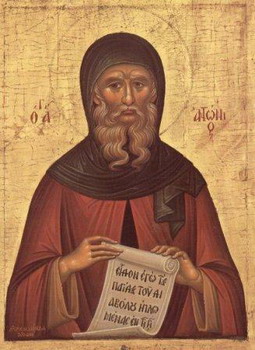 He was an Egyptian, born about 250 in a village called Quemen-el Arons near Heracleopolis. After the death of his rich and noble parents, he shared his inherited possessions with his sister, who was still in her minority, made sure that she was cared for, gave away his half of the inheritance to the poor and, at the age of twenty, consecrated himself to the life of asceticism that he had desired from childhood. At first he lived near his own village but then, in order to escape the disturbance of men, went off into the desert, on the shores of the Red Sea, where he spent twenty years as a hermit in company with no-one but God, in unceasing prayer, pondering and contemplation, patiently undergoing inexpressible demonic temptations. His fame spread through the whole world and around him gathered many disciples whom he, by word and example, placed on the path of salvation. In eighty-five years of ascetic life, he went only twice to Alexandria: the first time to seek martyrdom during a time of persecution of the Church, and the second at the invitation of St Athanasius, to refute the Arians" slanderous allegations that he too was a follower of the Arian heresy. He departed this life at the age of 105, leaving behind a whole army of disciples and followers. And, although Antony was unlettered he was, as a counsellor and teacher, one of the most learned men of his age, as also was St Athanasius the Great. When some Hellenic philosophers tried to test him with literary learning, Antony shamed them with the question: "Which is older, the understanding or the book? And which of these is the source of the other?" The shamed philosophers dispersed, for they saw that they had only book-learning without understanding, while Antony had understanding. Here was a man who had attained perfection insofar as man is able on earth. Here was an educator of educators and teacher of teachers, who for a whole eighty-five years perfected himself, and only thus was able to perfect many others. Full of years and great works, Antony entered into rest in the Lord in the year 356. He was an Egyptian, born about 250 in a village called Quemen-el Arons near Heracleopolis. After the death of his rich and noble parents, he shared his inherited possessions with his sister, who was still in her minority, made sure that she was cared for, gave away his half of the inheritance to the poor and, at the age of twenty, consecrated himself to the life of asceticism that he had desired from childhood. At first he lived near his own village but then, in order to escape the disturbance of men, went off into the desert, on the shores of the Red Sea, where he spent twenty years as a hermit in company with no-one but God, in unceasing prayer, pondering and contemplation, patiently undergoing inexpressible demonic temptations. His fame spread through the whole world and around him gathered many disciples whom he, by word and example, placed on the path of salvation. In eighty-five years of ascetic life, he went only twice to Alexandria: the first time to seek martyrdom during a time of persecution of the Church, and the second at the invitation of St Athanasius, to refute the Arians" slanderous allegations that he too was a follower of the Arian heresy. He departed this life at the age of 105, leaving behind a whole army of disciples and followers. And, although Antony was unlettered he was, as a counsellor and teacher, one of the most learned men of his age, as also was St Athanasius the Great. When some Hellenic philosophers tried to test him with literary learning, Antony shamed them with the question: "Which is older, the understanding or the book? And which of these is the source of the other?" The shamed philosophers dispersed, for they saw that they had only book-learning without understanding, while Antony had understanding. Here was a man who had attained perfection insofar as man is able on earth. Here was an educator of educators and teacher of teachers, who for a whole eighty-five years perfected himself, and only thus was able to perfect many others. Full of years and great works, Antony entered into rest in the Lord in the year 356.The Holy Emperor Theodosius the Great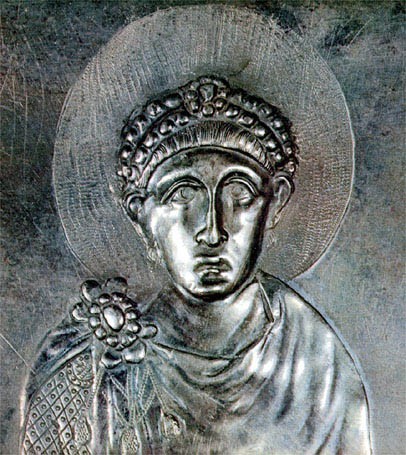 This famous Emperor, a zealot for the Faith, ruled from 379 to 395. Constantine the Great forbade the persecution of Christians. Theodosius the Great went a stage further: he forbade sacrifice to idols in the area under his administration. He played a considerable part in the establishing and spread of the Christian faith in the world. This famous Emperor, a zealot for the Faith, ruled from 379 to 395. Constantine the Great forbade the persecution of Christians. Theodosius the Great went a stage further: he forbade sacrifice to idols in the area under his administration. He played a considerable part in the establishing and spread of the Christian faith in the world.The Holy Martyr George the New of Ioannina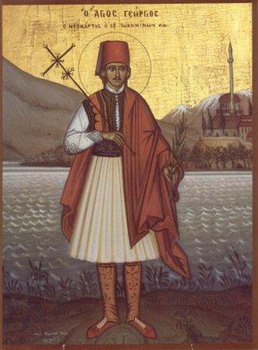 He was an Albanian, born in the village of Churkli of very poor parents, farm-labourers. Made a target by the Turks for conversion to Islam, he remained steadfast in the Christian faith, for which he was hanged in Ioannina on January 17th, 1838. A great wonderworker and healer, he is still active today. He was an Albanian, born in the village of Churkli of very poor parents, farm-labourers. Made a target by the Turks for conversion to Islam, he remained steadfast in the Christian faith, for which he was hanged in Ioannina on January 17th, 1838. A great wonderworker and healer, he is still active today.Venerable Anthony the New Wonderworker, of Veria in GreeceVenerable Anthony of Chernoezero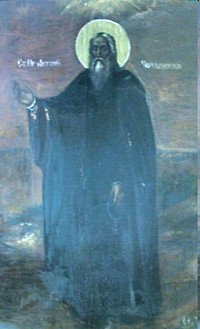 Saint Anthony of Black Lake founded the Mother of God monastery at Black Lake [Chernoezero] in the Novgorod area, not far from the city of Chernopovets. The monastery was on an island of the Schirsk countryside. The monastery twice suffered complete destruction: in 1581, from the Lithuanians; and in 1682, from the Swedes. The monastery was closed in 1764. Saint Anthony of Black Lake founded the Mother of God monastery at Black Lake [Chernoezero] in the Novgorod area, not far from the city of Chernopovets. The monastery was on an island of the Schirsk countryside. The monastery twice suffered complete destruction: in 1581, from the Lithuanians; and in 1682, from the Swedes. The monastery was closed in 1764.St Achilles the ConfessorSaint Achilles the Confessor lived the life of a hermit in Egypt, and died during the fifth century.
Venerable Anthony of Dymsk, Novgorod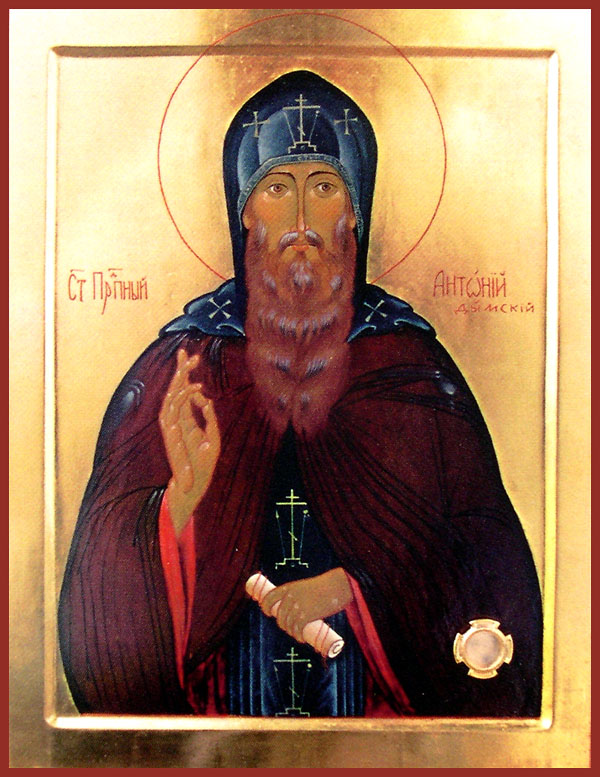 Saint Anthony of Dymsk was born at Novgorod in about the year 1157. Once in church he heard the words of Christ: “If anyone would come after Me, let him deny himself and take up his cross and follow Me” (Mt.16:24), the saint resolved to leave the world and receive monastic tonsure under St Barlaam of Khutyn (November 6) at his monastery.
When he was dying, St Barlaam appointed St Anthony as igumen in his place; but Anthony, shunning glory, left the monastery and settled at the shores of Lake Dyma, on the outskirts of the city of Tikhvin. Here he founded a monastery and struggled there until the end of his own life.
According to Tradition, St Anthony made a journey to Constantinople, and returned to his monastery on the day that the igumen Barlaam died. St Anthony fell asleep in the Lord on June 24, 1224. In the year 1330 his relics were found incorrupt, and from that time they were glorified by many miracles. Saint Anthony of Dymsk was born at Novgorod in about the year 1157. Once in church he heard the words of Christ: “If anyone would come after Me, let him deny himself and take up his cross and follow Me” (Mt.16:24), the saint resolved to leave the world and receive monastic tonsure under St Barlaam of Khutyn (November 6) at his monastery.
When he was dying, St Barlaam appointed St Anthony as igumen in his place; but Anthony, shunning glory, left the monastery and settled at the shores of Lake Dyma, on the outskirts of the city of Tikhvin. Here he founded a monastery and struggled there until the end of his own life.
According to Tradition, St Anthony made a journey to Constantinople, and returned to his monastery on the day that the igumen Barlaam died. St Anthony fell asleep in the Lord on June 24, 1224. In the year 1330 his relics were found incorrupt, and from that time they were glorified by many miracles. St Anthony of Krasny Kholm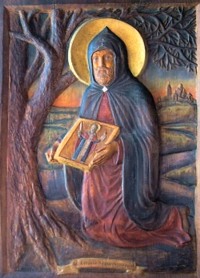 Saint Anthony of Krasny Kholm was initially a wilderness-dweller in the vicinity of White Lake. The hieromonk arrived in the region of Tver and settled near “Pretty Hillock” [“Krasny kholm”], at the bank of the River Mologa, building a chapel and cell there. After the discovery of an icon of St Nicholas, a stone church was built and a monastery founded, headed by the saint, who taught the brethren both by word and by example throughout his life. St Anthony died in 1481. Saint Anthony of Krasny Kholm was initially a wilderness-dweller in the vicinity of White Lake. The hieromonk arrived in the region of Tver and settled near “Pretty Hillock” [“Krasny kholm”], at the bank of the River Mologa, building a chapel and cell there. After the discovery of an icon of St Nicholas, a stone church was built and a monastery founded, headed by the saint, who taught the brethren both by word and by example throughout his life. St Anthony died in 1481. |